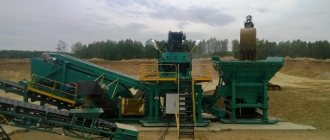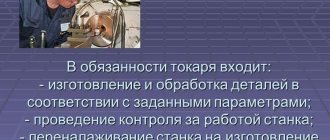This job description was developed and approved in accordance with the provisions of the Labor Code of the Russian Federation, the Unified Tariff and Qualification Directory of Work and Professions of Workers, Issue 1, Professions of Workers Common to All Sectors of the National Economy (approved by the resolution of the State Committee for Labor of the USSR and the Secretariat of the All-Union Central Council of Trade Unions dated January 31, 1985 N 31/3-30), Order of the Ministry of Health and Social Development of the Russian Federation dated August 11, 2011 N 906n “On approval of the Standard Standards for the free issuance of special clothing, special footwear and other personal protective equipment to chemical industry workers engaged in work with harmful and (or) dangerous working conditions, as well as work performed in special temperature conditions or associated with pollution” and other regulations governing labor relations.
Job responsibilities
The 4th category work distributor is assigned the following job responsibilities:
2.1. Reception, issuance and storage of critical expensive parts, mechanisms, assemblies in areas with a large range of items.
2.2. Providing workplaces with critical and expensive materials, blanks, semi-finished products, as well as devices, tools and technical documentation.
2.3. Maintaining records and reporting.
2.4. Removal of work in progress.
2.5. Drawing up comparison sheets of the movement of parts and mechanisms.
2.6. Drawing up and execution of reports when a shortage of parts, mechanisms and assemblies is detected.
2.7. Accounting for the passage of products and components according to the schedule.
2.8. Management of workers of lower ranks of the same profession.
2.9. [Other job responsibilities].
Work distributor job responsibilities at the plant
Illegal use of granted official powers, as well as their use for personal purposes.
Failure to take measures to suppress identified violations of safety regulations, fire safety and other rules that pose a threat to the activities of the enterprise and its employees.
A 2nd category work distributor belongs to the category of workers and reports directly to [name of the position of the immediate supervisor in the dative case] of the Company.
For causing material damage to the organization - within the limits established by the current labor and civil legislation of the Russian Federation. Responsibilities: Reception, issuance, accounting and reporting of expensive materials and parts with the removal of work in progress. Carrying various semi-finished products, parts, raw materials, batches of devices to workplaces.
Rights
A 4th category work distributor has the right to:
3.1. For all social guarantees provided for by law.
3.2. Get acquainted with the draft decisions of the enterprise management concerning its activities.
3.3. Require the management of the enterprise to provide assistance in the performance of their professional duties and the exercise of rights.
3.4. Require the creation of conditions for the performance of professional duties, including the provision of the necessary equipment, inventory, a workplace that complies with sanitary and hygienic rules and regulations, etc.
3.5. Submit proposals for improvement of the organization and methods of work performed by the enterprise management for consideration.
3.6. To receive special clothing, special shoes and other personal protective equipment.
3.7. Improve your professional qualifications.
3.8. To other rights provided for by labor legislation
Work distributor
For all social guarantees provided for by law. 3.2. Get acquainted with the draft decisions of the enterprise management concerning its activities. 3.3. Require the management of the enterprise to provide assistance in the performance of their professional duties and the exercise of rights. 3.4. Require the creation of conditions for the performance of professional duties, including the provision of the necessary equipment, inventory, workplace that complies with sanitary and hygienic rules and regulations, etc. 3.5. Submit proposals for improvement of the organization and methods of work performed by the enterprise management for consideration. 3.6. To receive special clothing, special shoes and other personal protective equipment. 3.7. Improve your professional qualifications. 3.8. To other rights provided for by labor legislation. 4.
§ 290. Work distributor (2nd category)
Characteristics of work
. Maintenance of a site or workshop that produces a complex range of products and has a variety of production cooperation, under the guidance of a more highly qualified work distributor, or independent maintenance of a site with a simple range of products and limited production cooperation. Providing workplaces with parts, semi-finished products, tools, work orders and other technical documentation in accordance with shift assignments. Reception of blanks and semi-finished products for the site. Delivery of finished parts to the warehouse. Delivery and quantitative acceptance of parts undergoing interoperational processing in other workshops and areas.
Must know:
production task of serviced areas and workload schedule; technological sequence of processing of main parts; the range of processed units and parts in the serviced area; the procedure for recording details and established documentation; rules for transporting parts.
Work distributor job responsibilities of Russian Railways
Observe personal hygiene rules, wash your hands with soap before eating. It is not allowed to smoke, eat or store food (water), or store personal and work clothing in the workplace. Smoking is allowed only in specially equipped areas.
Involve specialists from all (individual) structural divisions of the Company in solving the tasks assigned to him (if this is provided for by the regulations on structural divisions, if not, with the permission of the head of the Company).
Drawing up and execution of reports when a shortage of parts, mechanisms and assemblies is detected. Accounting for the passage of products and components according to the schedule.
§ 291. Work distributor (3rd category)
Characteristics of work
. Maintenance of a site, a workshop that produces a complex range of products with a variety of production cooperation. Providing workplaces with parts, semi-finished products, tools, work orders and other technical documentation in accordance with established shift assignments. Reception of blanks and semi-finished products to the site and delivery of finished products to the warehouse. Participation in the preparation of shift-daily production assignments for areas, as well as maintaining records of work performed.
Must know:
shift-daily production assignments for serviced areas and workload schedules; technological sequence of parts processing; the range of components and parts processed in the service area; rules for storing parts and the procedure for completing established documentation; the basics of planning workloads and accounting for work performed; procedure for processing primary payment documents.
General provisions
1.1. The position “Work Distributor of the 2nd category” belongs to the “Workers” category.
1.2. Qualification requirements - complete general secondary education and vocational training in production, without requirements for work experience.
1.3. Knows and applies in practice: - production assignment of areas served and workload schedule; — technological sequence of processing the main parts; — nomenclature of components and parts processed in the area being serviced; — the procedure for recording details and established documentation; — rules for transporting parts.
1.4. A 2nd category work distributor is appointed to the position and dismissed from the position by order of the organization (enterprise/institution).
1.5. The 2nd category work distributor reports directly to _ _ _ _ _ _ _ _ _ _ .
1.6. The 2nd category work distributor supervises the work of _ _ _ _ _ _ _ _ _ _ .
1.7. During absence, a 2nd category work distributor is replaced by a person appointed in accordance with the established procedure, who acquires the corresponding rights and is responsible for the proper performance of the duties assigned to him.
Work instructions for work distributor (4th category)
- How to write a job description correctly?
This instruction has been automatically translated. Please note that automatic translation is not 100% accurate, so there may be minor translation errors in the text. The instructions for the position “Distributor of works of the 4th category”, presented on the website www.borovik.com, comply with the requirements of the document - “DIRECTORY OF Qualification Characteristics of Employee Professions. Issue 1. Professions of workers that are common to all types of economic activity,” which was approved by order of the Ministry of Labor and Social Policy of Ukraine dated December 29, 2004 N 336. The status of the document is 'current'. Job description in Ukrainian Download as DOC file Preface 0.1. The document comes into force from the moment of approval. 0.2. Document developer: _ _ _ _ _ _ _ _ _ _ _ _ _ _ _ _ _ _ _ _ _ _ _. 0.3.
Characteristics of work, tasks and job responsibilities
2.1. Serves a site, a workshop that produces a complex range of products and which has a variety of production cooperation, under the guidance of a highly qualified work distributor, or independently services a site with a simple range of products and limited production cooperation.
2.2. Provides workplaces with parts, semi-finished products, tools, work orders and other technical documentation in accordance with the variable task.
2.3. Accepts blanks and semi-finished products for the site.
2.4. Delivers finished parts to the warehouse.
2.5. Performs delivery and quantitative acceptance of parts undergoing interoperational processing in other workshops and areas.
2.6. Knows, understands and applies current regulations relating to his activities.
2.7. Knows and complies with the requirements of regulations on labor protection and environmental protection, complies with the norms, methods and techniques for the safe performance of work.
Rights
3.1. The 2nd grade work distributor has the right to take actions to prevent and eliminate cases of any violations or inconsistencies.
3.2. A 2nd category work distributor has the right to receive all social guarantees provided for by law.
3.3. A 2nd category work distributor has the right to demand assistance in the performance of his official duties and the exercise of his rights.
3.4. A 2nd category work distributor has the right to demand the creation of organizational and technical conditions necessary for the performance of official duties and the provision of the necessary equipment and inventory.
3.5. The 2nd category work distributor has the right to get acquainted with draft documents relating to his activities.
3.6. A 2nd category work distributor has the right to request and receive documents, materials and information necessary to fulfill his job duties and management orders.
3.7. A 2nd category work distributor has the right to improve his professional qualifications.
3.8. A 2nd category work distributor has the right to report all violations and inconsistencies identified in the course of his activities and make proposals for their elimination.
3.9. A 2nd category work distributor has the right to familiarize himself with documents defining the rights and responsibilities of the position held, and criteria for assessing the quality of performance of official duties.
Responsibility
4.1. The 2nd category work distributor is responsible for non-fulfillment or untimely fulfillment of the duties assigned by this job description and (or) non-use of the granted rights.
4.2. A 2nd category work manager is responsible for failure to comply with internal labor regulations, labor protection, safety precautions, industrial sanitation and fire protection.
4.3. A 2nd category work distributor is responsible for disclosing information about an organization (enterprise/institution) that is a trade secret.
4.4. The 2nd category work distributor is responsible for non-fulfillment or improper fulfillment of the requirements of internal regulatory documents of the organization (enterprise/institution) and legal orders of management.
4.5. A 2nd category work distributor is responsible for offenses committed in the course of his activities, within the limits established by the current administrative, criminal and civil legislation.
4.6. A 2nd category work distributor is responsible for causing material damage to an organization (enterprise/institution) within the limits established by current administrative, criminal and civil legislation.
4.7. The 2nd category work distributor is responsible for the unlawful use of the granted official powers, as well as their use for personal purposes.
Added to the site:
Railway work distributor duties
A 4th category work distributor is responsible for disclosing information about an organization (enterprise/institution) that is a trade secret.
4.4.
Processing of incoming applications; Compilation... Full description DIUS, Zheleznodorozhny - superjob.ru: 21 hours ago Customer Service Manager, Sales Manager from RUB 30,000. up to 70,000 rubles, Full-time, from 1 year Work in a studio for website development, search engine promotion and contextual advertising Full time from 09-00 to 18-00, Sat-Sun - day off Salary consists of 2 parts:... Full description DIUS, Zheleznodorozhny - job-mo.ru: 6 days ago Customer Service Manager 40,000 rub.
General labor protection requirements
1.1. Persons who have undergone vocational training, introductory and initial instruction in the workplace on labor protection and who have the first qualification group in electrical safety, who have completed an internship and have received permission to work independently are allowed to work independently as a work distributor.
1.2. Repeated training is carried out at least once every 3 months. Repeated instructions on electrical safety are carried out at least once a year.
1.3. On the territory of the enterprise, it is necessary to comply with internal labor regulations, be attentive to moving vehicles, operating lifting machines and other production equipment.
Pay attention to warning notices, road signs and safety signs posted on the territory of the enterprise, in workshops and areas, following their instructions.
1.4. It is necessary to comply with the work and rest schedule established at the enterprise. Normal working hours cannot exceed 40 hours per week. Overtime work is allowed in cases provided for by the Labor Code of the Russian Federation. The total time for personal needs is 36 minutes during the work shift. In addition, there is a break for rest and food (30 minutes), which is not included in working hours.
1.5. The work distributor may be exposed to the following hazardous and harmful production factors:
Moving machines and mechanisms that are a source of injury;
Exposure to electric current, leading to various electrical injuries;
Increased and decreased air temperature, as well as increased mobility in the workplace, leading to colds;
Insufficient illumination of the workplace, leading to deterioration of vision.
1.6. For normal and safe work performance, the work distributor is provided with the following personal protective equipment:
1.7. The employee must receive fire safety training, know the rules for the use of combustible and flammable substances, the rules of behavior in case of fire and when signs of combustion are detected. When working on equipment, you must use working electrical fittings. .
18. Immediately notify your immediate or superior manager about any situation that threatens the life and health of people, about every accident that occurs at work, or about a deterioration in your health, including the manifestation of signs of an acute occupational disease / poisoning /.
1.9.The employee must notify his immediate supervisor about malfunctions of equipment, devices and tools before starting work or during the working day after detecting a malfunction. It is prohibited to independently repair any malfunctions if this work is not within the scope of your responsibilities.
1.10. The employee must provide first aid to victims of industrial accidents.
1.11. Observe personal hygiene rules, wash your hands with soap before eating. It is not allowed to smoke, eat or store food (water), or store personal and work clothing in the workplace. Smoking is allowed only in specially equipped areas.
1.12. Persons who do not comply with this instruction will be held accountable in accordance with the current legislation of the Russian Federation.
Labor protection instructions for work distributor
1.1. Persons who have undergone vocational training, introductory and initial instruction in the workplace on labor protection and fire safety, who have the first qualification group in electrical safety, who have completed an internship and have received permission to work independently are allowed to work independently as a work distributor.
1.2. Repeated training on labor protection is carried out at least once every 3 months. Repeated instructions on electrical safety are carried out at least once a year.
1.3. On the territory of the enterprise, it is necessary to comply with internal labor regulations, be attentive to moving vehicles, operating lifting machines and other production equipment.
Pay attention to warning notices, road signs and safety signs posted on the territory of the enterprise, in workshops and areas, following their instructions.
1.4. It is necessary to comply with the work and rest schedule established at the enterprise. Normal working hours cannot exceed 40 hours per week.
Overtime work is allowed in cases provided for by the Labor Code of the Russian Federation. The total time for personal needs is 36 minutes during the work shift.
In addition, there is a break for rest and food (30 minutes), which is not included in working hours.
1.5. The work distributor may be exposed to the following hazardous and harmful production factors:
– moving machines and mechanisms that are a source of injury;
– exposure to electric current, leading to various electrical injuries;
– increased and decreased air temperature, as well as increased mobility in the workplace, leading to colds;
– insufficient illumination of the workplace, leading to deterioration of vision.
1.6. For normal and safe work performance, the work distributor is provided with the following personal protective equipment:
| Individual protection means | GOST IL and TU | Wearing period /months/ |
| Cotton robe | GOST 12.4. 131 | 12 |
| Combined mittens | GOST 12.4.01 0 | 1 |
1.7. The employee must receive fire safety training, know the rules for the use of combustible and flammable substances, the rules of behavior in case of fire and when signs of combustion are detected. When working on equipment, you must use
proper electrical fittings. .
18. Immediately notify your immediate or superior manager about any situation that threatens the life and health of people, about every accident that occurs at work, or about a deterioration in your health, including the manifestation of signs of an acute occupational disease / poisoning /.
1.9.The employee must notify his immediate supervisor about malfunctions of equipment, devices and tools before starting work or during the working day after detecting a malfunction. It is prohibited to independently repair any malfunctions if this work is not within the scope of your responsibilities.
1.10. The employee must provide first aid to victims of industrial accidents.
1.11. Observe personal hygiene rules, wash your hands with soap before eating. It is not allowed to smoke, eat or store food (water), or store personal and work clothing in the workplace. Smoking is allowed only in specially equipped areas.
1.12. Persons who do not comply with this instruction will be held accountable in accordance with the current legislation of the Russian Federation.
Labor protection requirements before starting work
2.1. Wear clean and serviceable special equipment. clothes.
2.2. Prepare the necessary personal protective equipment.
2.3. Prepare the workplace for safe work, remove obstructive objects and clear passages.
2.4. Make sure there is sufficient lighting in the workplace. The light should not blind your eyes. In case of insufficient lighting, use local lighting, having previously checked it by external inspection for the absence of bare current-carrying areas.
Labor protection requirements during work
3.1. While working, be attentive, do not be distracted from your immediate responsibilities, and do not distract others with matters not related to work.
3.2. Do not go to other workshops and areas without production necessity and without the permission of the manager.
3.3. Exercise care and caution when moving through the territory of the enterprise, workshops and areas, and while carrying out work.
3.4. Do not enter the operating area of equipment that produces flying chips or splashes of molten metal and do not stop near it.
3.5. Do not pass or stop near places where people are working at height, or where cargo is being moved by a crane. Go around the indicated place at a safe distance, do not enter the fenced work area.
3.6. It is prohibited to sit on the running boards, external ledges, towbars of moving vehicles, sit on the sides of vehicles, or be in trailers while driving, or on auto- and electric forklifts that are not equipped with a seat for a passenger.
3.7. Do not cross the road in front of nearby vehicles.
3.8. Do not try to pass or jump over folded material and parts, but walk around with a free passage.
3.9. Do not sit or stand on folded material or parts.
3.10. Do not jump over open wells, trenches, ditches.
3.11. Do not look at the welding arc when driving past welding sites.
3.12. Replacement of light bulbs, switches, and sockets should only be performed by electrical personnel.
3.13. Ensure the cleanliness of the lighting lamp in your workplace. Pollution and dust do not provide the necessary lighting.
3.14. When meeting a vehicle in the workshop, move to a safe place and let the vehicle pass. Do not stop in cramped places, narrow passages, or doors, as you may be pinned down by moving vehicles.
3.15. Observe fire and explosion safety: do not light matches, do not smoke, do not use open flames where flammable liquids are stored and used.
3.16. Do not use electric heating devices (stoves, kettles, fireplaces, etc.), including homemade ones, in offices, workplaces, and household premises, unless this is provided for by the technological processes and there is special permission for this.
3.17. For drinking, use drinking water fountains or sparkling water facilities.
3.18. Before eating, wash your hands with hot water and soap.
Occupational safety requirements in emergency situations
4.1. If an emergency occurs, immediately inform your immediate supervisor and take measures to warn surrounding people about the danger.
4.2. If there is a fire or signs of burning are detected, immediately notify the fire brigade by phone..., inform the foreman or superior and begin to extinguish the fire using available fire extinguishing means. If necessary, call the city fire department by calling 112 and arrange a meeting of the fire brigade.
4.3. In the event of an accident with you or another employee, stop work, notify the foreman, provide first aid to the victims and go to the health center in person or call...
4.4 Ensure the safety of the situation of the accident or incident, if this does not pose a danger to the life and health of people and does not lead to aggravation of the emergency situation. If necessary, call emergency medical assistance by calling 112.
4.5 In case of failure of water supply, heating systems, etc. interfering with the performance of technological operations, stop work until the accident and its consequences are eliminated.
Labor protection requirements upon completion of work.
5.1 Put the workplace in order, remove production waste into the prescribed containers according to the markings.
5.2 Report any deficiencies discovered during work to your immediate supervisor.
5.3 Put clothes in a specially designated place, wash your hands with warm water and soap or take a shower.
Source: https://prom-nadzor.ru/content/instrukciya-po-ohrane-truda-dlya-raspredelitelya-rabot
Labor protection requirements before starting work
2.1. Wear clean and serviceable special equipment. clothes.
2.2. Prepare the necessary personal protective equipment.
2.3. Prepare the workplace for safe work, remove obstructive objects and clear passages.
2.4. Make sure there is sufficient lighting in the workplace. The light should not blind your eyes. In case of insufficient lighting, use local lighting, having previously checked it by external inspection for the absence of bare current-carrying areas.
Labor protection requirements during work
3.1. While working, be attentive, do not be distracted from your immediate responsibilities, and do not distract others with matters not related to work.
3.2. Do not go to other workshops and areas without production necessity and without the permission of the manager.
3.3. Exercise care and caution when moving through the territory of the enterprise, workshops and areas, and while carrying out work.
3.4. Do not enter the operating area of equipment that produces flying chips or splashes of molten metal and do not stop near it.
3.5. Do not pass or stop near places where people are working at height, or where cargo is being moved by a crane. Go around the indicated place at a safe distance, do not enter the fenced work area.
3.6. It is prohibited to sit on the running boards, external ledges, towbars of moving vehicles, sit on the sides of vehicles, or be in trailers while driving, or on auto- and electric forklifts that are not equipped with a seat for a passenger.
3.7. Do not cross the road in front of nearby vehicles.
3.8. Do not try to pass or jump over folded material and parts, but walk around with a free passage.
3.9. Do not sit or stand on folded material or parts.
3.10. Do not jump over open wells, trenches, ditches.
3.11. Do not look at the welding arc when driving past welding sites.
3.12. Replacement of light bulbs, switches, and sockets should only be performed by electrical personnel.
3.13. Ensure the cleanliness of the lighting lamp in your workplace. Pollution and dust do not provide the necessary lighting.
3.14. When meeting a vehicle in the workshop, move to a safe place and let the vehicle pass. Do not stop in cramped places, narrow passages, or doors, as you may be pinned down by moving vehicles.
3.15. Observe fire and explosion safety: do not light matches, do not smoke, do not use open flames where flammable liquids are stored and used.
3.16. Do not use electric heating devices (stoves, kettles, fireplaces, etc.), including homemade ones, in offices, workplaces, and household premises, unless this is provided for by the technological processes and there is special permission for this.
3.17. For drinking, use drinking water fountains or sparkling water facilities.
3.18. Before eating, wash your hands with hot water and soap.
Occupational safety requirements in emergency situations
4.1. If an emergency occurs, immediately inform your immediate supervisor and take measures to warn surrounding people about the danger.
4.2. If there is a fire or signs of burning are detected, immediately notify the fire brigade by phone..., inform the foreman or superior and begin to extinguish the fire using available fire extinguishing means. If necessary, call the city fire department by calling 112 and arrange a meeting of the fire brigade.
4.3. In the event of an accident with you or another employee, stop work, notify the foreman, provide first aid to the victims and go to the health center in person or call...
4.4 Ensure the safety of the situation of the accident or incident, if this does not pose a danger to the life and health of people and does not lead to aggravation of the emergency situation. If necessary, call emergency medical assistance by calling 112.
4.5 In case of failure of water supply, heating systems, etc. interfering with the performance of technological operations, stop work until the accident and its consequences are eliminated.










